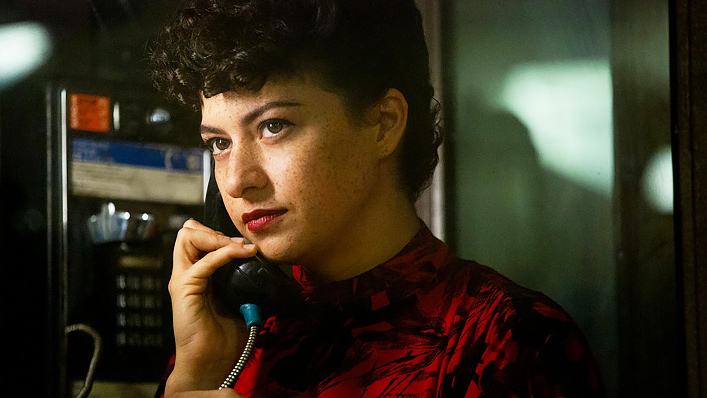Search Party is TV’s most underrated millennial murder mystery

The first three seasons of the hipster dramedy Search Party (starring Alia Shawkat) recently landed on Stan. Here’s why Eliza Janssen thinks the show is a thoughtful and hilarious crime odyssey.
It can become pretty tiresome to think of media in terms of whether it’s overrated or underrated; judging a show or movie for its critical or audience reception, rather than by its own merits or failings. But I think the narcissistic hipster characters of Search Party would welcome their series’ under-seen, underdog status.
See also
* All new movies & series on Stan
* All new streaming movies & series
Being a group of self-destructive New York millenials, Dory, Drew, Portia and Elliott would surely love the fact that they’re the stars of TV’s most underrated half-hour dramedy. Dory (Arrested Development’s Alia Shawkat) begins the series as a lost girl in an unforgiving city. Saddled with a demeaning minimum wage job and a lukewarm relationship with her dopey boyfriend Drew (John Reynolds), Dory’s life is given purpose when she learns that an old college acquaintance has gone missing. With nothing else to do, Dory begins an exhaustive investigation into Chantal’s disappearance, dragging along Drew and her two most self-obsessed friends, fraudulent gay hipster Elliott and bubbly actress Portia (a revelatory pair of comedy performances from John Early and Meredith Hagner).
Search Party exhibits a Seinfeld-ian philosophy at times, following four accident-prone New Yorkers as they navigate cringe-worthy situations in a misanthropic world. A helpful potential lead (Rosie Perez) turns out to be a paranoid lunatic; the discovery of an ultrasound photo turns out to be nothing but a red herring. But it’s also a series perfectly pitched between a serialised, thrilling murder mystery and hilarious millennial character drama. As the gang becomes involved with lifestyle cults, a seductive private investigator, and ultimately a national murder scandal, each escalating conflict forces out more and more of their character. By season three, these spoiled dilettantes feel both heightened and painfully relatable as people.
Another drawcard is in Search Party’s playful eye for production design detail. Dory probably has one of TV’s most enviable wardrobes, nailing the style of a hip 20-something with little else going on in their life. Her series-spanning evolution from a plucky amateur sleuth to a smirking film noir femme-fatale is partially conveyed to the audience through Dory’s fashion sensibility, as is Elliott’s increasingly tyrannical grip on his public image (this man has never met a stupid experimental hat or scarf he didn’t like). Parker Posey makes a season one cameo as a character named Brick, if you’re looking for another piece of evidence as to the series’ indie cred and irrepressible quirkiness.
But a show about shallowness itself doesn’t need to be accordingly superficial. Amongst the laughs and non sequiturs, Search Party has a lot to say about the origins of millennial ennui, of the insipid cruelties of the gig economy, and of what glib social media truisms like ‘being your best self’ really look like when put to the test. The show’s half-hour episodes are devilishly easy to watch, and that ease is cleverly weaponised by Search Party’s writing team. Before you know it, you’ll be drawn in by the series humour and style, tricked into wanting for Dory and her friends to get away with their multitude of crimes.
As the well-meaning Dory, Shawkat is one of TV’s latest and most refreshing anti-heroes. These kind of amoral but sympathetic figures have long been the property of long-winded prestige dramas relegated to Emmy-winning HBO series; think Tony Soprano, Don Draper, Walter White. But in its comparatively light-hearted, indie comedy approach, Search Party is trying to do something different; constantly giving us reason to love its cooler-than-thou, self-involved characters, while never letting them off the hook for the sins they’ve committed.
The upcoming and final fourth season can’t arrive quickly enough. Until then, newcomers to the series can follow Dory and friends down their privileged path to perdition over three terrific seasons of dramedy storytelling. As a hard-nosed prosecutor trying to get Dory and her friends locked up for good, SNL alum Michaela Watkins complains: “People hate millennials, right?” She might be right, but what she doesn’t realise is that this generational satire’s biting depiction of millennial delusion only makes it all the more loveable and addictive.



















